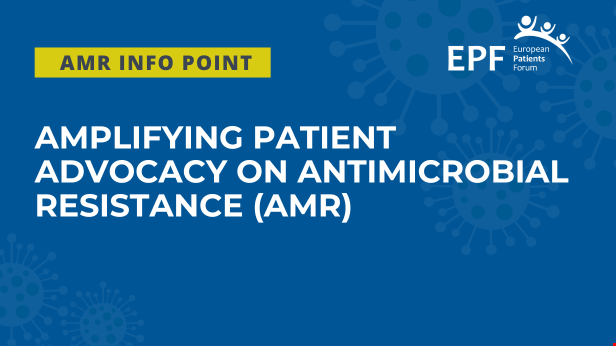Amplifying Patient Advocacy on Antimicrobial Resistance (AMR)

Understanding Antimicrobial Resistance (AMR) and its impact on patients. The AMR Info Point is dedicated to providing extensive resources on AMR. Our goal is to improve awareness and understanding of AMR among patient communities.
Antimicrobial Resistance (AMR) presents a significant global health threat across diverse sectors, including human, animal, plant, food, and the environment. The multisectoral approach to addressing AMR in these sectors is termed One Health. In 2019, the Global Research on Antimicrobial Resistance (GRAM) report found that 1.27 million deaths were directly attributed to bacterial AMR alone.
This challenge, which jeopardises the very foundation of modern medicine and directly impacts patients across disease areas, including cancer, rare diseases (e.g., cystic fibrosis and others), tuberculosis (TB), HIV/AIDS, malaria, sexually transmitted infections (STIs), urinary tract infections (UTIs), respiratory tract infections (RTIs), healthcare-associated infections (HAIs), surgery, sepsis demands urgent attention for effective coordinated actions.
Addressing the intricate nature of AMR poses difficulties in bridging the gap with diverse audiences, particularly regarding intersectional coordination and advocacy among patient groups and civil society organisations. Enhancing comprehension and relatability concerning AMR is essential for fostering awareness and a robust response to AMR.
The role of patient organisations in combating AMR
Patient organisations are crucial in the fight against AMR. They contribute by:
- Raising Awareness: Educating patients and the public about AMR as both a public health and patient safety issue.
- Advocating for Safe Healthcare and more ambitious actions: Ensuring that patients have access to effective treatments and safe healthcare practices and that policy-makers are committed to implementing strong AMR policies at all levels.
- Providing Resources: Offering information and materials to help patients and patient communities understand and combat AMR.
- Working with healthcare professionals and other relevant stakeholders to implement best practices, including antimicrobial stewardship programmes and infection prevention and control measures within healthcare settings
- Encouraging data collection and reporting on AMR trends and antibiotic-resistant infections
Increasing awareness in disease communities
Many patients within various disease communities might not be fully aware of AMR or how it affects them directly. Our goal is to improve awareness and understanding of AMR among these patients.
Comprehensive resources on AMR
This info point is dedicated to providing extensive resources on AMR. Here, you will find:
- Webinar Series | Amplifying Patient Advocacy on AMR
- EPF AMR Communications Toolkit
- EPF statements on AMR:
- Policy paper: Antimicrobial Resistance Through Patients' Eyes:
Stories and Insights (December 2024) - Joint statement on the Political Declaration of the UN General Assembly High-level Meeting on Antimicrobial Resistance (26 September 2024)
- Statement for the European Antibiotic Awareness Day (November 2023)
- Statement on the European Commission’s proposal for a Council Recommendation on stepping up EU actions to combat antimicrobial resistance (AMR) (June 2023)
- Policy paper: Antimicrobial Resistance Through Patients' Eyes:
- EPF presentations on AMR:
- External resources:
- European Centre for Disease Prevention and Control
- EU Action on AMR
- European Commission Resources Hub
- ReACT's toolbox "Understand"
- The AMR Narrative's Social Media Advocacy Toolkit for Antimicrobial Resistance (AMR)
- World Health Organization (WHO) Taskforce for AMR survivors
- WHO report "People-centred approach to tackling antimicrobial resistance: key principle of the Roadmap on antimicrobial resistance for the WHO European Region 2023–2030"
- The Food and Agriculture Organization of the United Nations (FAO), the United Nations Environment Programme (UNEP), WHO, and the World Organisation for Animal Health (WOAH):
Related Information

